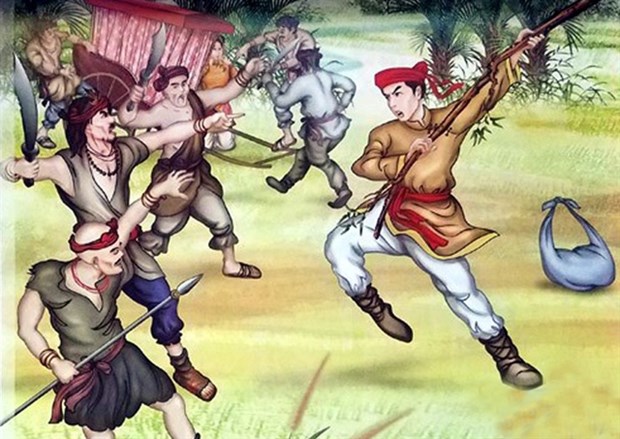Vietnam celebrates 200th birthday of blind poet

A painting from the book Luc Van Tien (The Tale of Luc Van Tien), an epic poem with 2,076 lines by late poet and teacher Nguyễn Đình Chiểu (1822 – 1888), one of the country’s leading writers in the 19th century. (Photo courtesy of the Culture & Art Publishing House)
A series of cultural activities and art shows celebrating Vietnamese poet Nguyen Dinh Chieu's 200th birthday anniversary (July 1) are taking place in HCM City and southern provinces.
A special exhibition on poet Chieu has opened and will run through July at the HCM City Museum.
The event is called Danh Nhan Van Hoá Nguyen Dinh Chieu - Cuoc Doi Va Su Nghiep (Man of Culture Nguyen Dinh Chieu - Life and Career).
It features 95 photos, paintings and information about the poet, his life and career.
Chieu’s famous literary works, including the epics Luc Van Tien (The Tale of Luc Van Tien) and Van Te Nghia Si Can Giuoc (Funeral Oration for the Partisans of Can Giuoc), are also displayed.
Nguyen Dinh Chieu (1822 – 1888) was born in Binh Duong, Gia Dinh province (now District 1, Ho Chi Minh City).
He was a patriotic teacher, physician and poet of southern Vietnam in the second half of the 19th century.
At around age 24, Chieu contracted an eye infection and was soon blind. Just before this infection, he learned of his mother’s death, and according to legend, Chieu was so heartbroken he was said to have gone blind with grief.
He opened a small school to teach poor students in Gia Dinh. He was also a popular medical practitioner who offered treatment for local people.
He later moved to Can Giuoc in Long An province (now Ben Tre province), where he died.
His Luc Van Tien was written in nom (the old Chinese-based Vietnamese script) in the 1850s. It is one of the two most celebrated Vietnamese epic poems, along with Nguyen Du’s Truyen Kieu (The Tale of Kieu) in the early 19th century.
The 2,076 line-work highlights the culture and lifestyle of southern people. Topics of love, loyalty, bravery and fair justice are featured.
The epic is used in textbooks for secondary high school students. It has been translated into many languages, including French, English and Japanese.
It has been adapted into many theatre plays of cai luong (reformed opera) and tuong (classical drama) as well as movies.
Van Te Nghia Si Can Giuoc highlights patriotism. It features the author’s nationalism and anti-colonialism against the French colonisation of Cochinchina, the European name for the southern part of Vietnam.
Another well-known work by Chieu is Ngu Tieu Y Thuat Van Dap (Medical discussion between fisherman and woodcutter). It includes useful information and knowledge on traditional Vietnamese medicine.
In Ben Tre province, a ceremony to honour and celebrate Chieu’s 200th birthday will take place on July 1 at the Nguyen Dinh Chieu Temple, where the tomb and monument of the poet are located. Drama shows will be also staged.
The highlighted show will be Tien Nga (Fairy Tale), a musical play based on Chieu’s Luc Van Tien, by talented artists of the private drama theatre IDECAF of HCM City.
The play is about the life of Luc Van Tien, a poor student who travels to the capital to take a civil service examination for mandarins. He rescues Kieu Nguyet Nga, a beautiful woman from a wealthy family, from a robbery. They fall in love but cannot be together because of feudal society's mores.
“We hope our musical show, Tien Nga, will attract local people and visitors in Ben Tre – homeland of poet Chieu,” said Huynh Anh Tuan, owner and managing director of the IDECAF.
Last year, a proposal for the celebration of Chieu’s 200th birthday anniversary was submitted and is expected to be approved by the UNESCO General Assembly in November.
The proposal has received support and recognition from the Republic Korea, Thailand, Japan and India.
UNESCO has commemorated the birth anniversaries of four Vietnamese celebrities, including the late President Ho Chi Minh, educator Chu Van An, and poets Nguyen Du and Nguyen Trai./.
VNA

